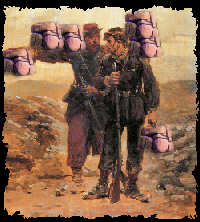|
“Then said Jesus, Father, forgive them
for they know not what they do…” (Luke
23:24).

Jesus set the pace for our interpersonal
relationships: His unconditional
forgiveness—to the ones causing His death.
There was no personal gain by forgiving
His murderers: the
instrument of death had already been
administered, no bargaining for life, no
pleading for mercy for Himself, just
forgiveness for those who were taking
His life. Nothing demonstrates the
importance and necessity of forgiveness
like Jesus' statement from the cross,
“Father, forgive them”!

(Note: "Unforgiveness" may not be
a word you can find in Webster's
Dictionary, but I will be using it
throughout this article. I think
you will completely understand its use
here.)
As the Easter season approaches, it is
an appropriate time to examine our
hearts to see if we have any
unforgiveness tucked away in a secret
place, maybe even hidden from ourselves,
obscured as we have tried to forget
instead of forgive.

Matthew 18:23-35. Jesus told this
parable.
A king was taking account of his
servants, and one was brought before him
who owed him 10,000 talents (50 million
silver coins, according to one source).
We don’t know how he accumulated such a
large debt. Perhaps he was in the tax
collection department or the kings’
accounting office and hadn’t settled
with him. Most likely he had already
spent much of the money he had acquired
without settling with the king; so he
was unable to pay the debt.

The king commanded that he, his wife,
his children and everything they owned
be sold as payment. This probably would
only amount to a payment on the large
debt.
The servant begged for mercy and
patience from the king to pay the debt.
The king was moved with compassion and
forgave the debt, marking it “Paid in
full.” (Just like Jesus did for us.) A
happy day for that servant!

However, he went out and found a
fellow servant (must have been looking for
him) who owed him 100 denarii (100
silver coins, a pittance compared to the
debt he was forgiven). He grabbed him
by the throat and demanded payment in
full for this small debt. The poor man
couldn’t pay. Though he pleaded for
mercy and promised to pay it all if his
creditor would just have patience and
give him time. The forgiven servant
refused to show mercy even though he had
received full forgiveness for his debt
and cast his debtor into prison until he
could pay it all (How could he pay if he
were in prison?).

The injustice was reported to the king.
When the king learned of the lack of
compassion of the one forgiven toward
his fellow servant and his unwillingness
to forgive the small debt after
receiving mercy himself, the king
reinstated the entire amount of the debt
that was forgiven. Now the
previously forgiven servant’s debt was
back at 50 million gold coins, and he
landed in prison at the hands of
tormentors “until he should pay all that
was due.”

Can we lose our forgiveness by failing
to forgive others? How can we “pay all
that is due” when Jesus is the one who
paid for the original debt which we were
unable to liquidate?
The Bible teaches us that our sins,
once forgiven, are in a forgetful place
where God won’t remember them any more.
Remember, the parable was to teach us
about forgiving and the consequence of
not forgiving. How can the forgiven
debt be reinstated if God has forgotten
about it?
Further, look at Matthew 18:35. “So
my heavenly Father also will do to you
if each of you [everyone], from his
heart [emphasis mine] does not
forgive his brother his trespasses.”
So if I don’t forgive and I am now back
in debt, what happened to my sins that
had already been forgiven?
They are still forgiven!

The problem lies in the weight and value
of the sin of unforgiveness. It appears
that the sin of not being forgiving to
others is equal
in weight and value to all the sins I
have committed that had previously been forgiven. Unforgiveness short circuits our
connection to God’s forgiveness. That’s
heavy!

The whole principal of salvation is
based on forgiveness. If we had not
received God’s merciful forgiveness, we
would have a debt that was impossible to
pay. Our compassionate God forgave us
all our sins because of Jesus. “I owed
a debt I couldn’t pay. Jesus paid a
debt He didn’t owe” to achieve my
forgiveness with God. Like the king in
the parable, God expects that kind of
mercy and forgiveness from us toward
others.

The Lord taught His disciples that they
(and we) would be forgiven AS (same way,
unconditionally) that we forgive others.
The Amplified Bible says it like this:
"And forgive us our debts, as we also
have forgiven (left, remitted, and let
go of the debts, and have given up
resentment against) our debtors"
(Matthew 6:12).
Failure to forgive sets up a road
block to God’s forgiveness toward us.
It’s not our past forgiven sins that are
blocking God’s forgiveness; it is the
sin of unforgiveness. Not
forgiving others
closes the door of our heart, making it
impossible to give entrance to
forgiveness of God for our
transgression of not being forgiving of
others. We have to harden our
hearts to hold on to unforgivensss
toward others. This hardness is a
deadbolt lock to the
door to God’s forgiveness toward us.

Luke 11:4 “…for we forgive everyone
who is indebted to us.”
Mark 11:26 “But if you do not
forgive, neither will your Father in
heaven forgive your trespasses.” (Also
Matthew 6:15).

The seriousness of unforgiveness is that
the weight of that sin puts us back
in debt to God with a debt we can’t
pay. For the king’s servant, his unforgiveness weighed 50 million gold
coins, an equal amount of the original
total he was forgiven. So we can
conclude from that parable that God
considers our unforgiveness to be equal
to all that we have been forgiven that
He doesn’t remember. He only remembers
the sin of unforgiveness, but what a
heavy weight it carries--equal to all
our forgiven sin!

Forgiveness has to be ongoing. Seventy
times seven daily might not be enough.
We may have to forgive the same person
for the same thing over and over again,
just like God does us, without a
scorecard. We may have to forgive
someone—from our heart—who has already
left this life even though we can’t tell
them. Forgiveness may not be sought by
the one who offended us, and they might
even reject our efforts for
reconciliation; but we have to forgive.
It’s the doorway to being healed of the
offence and to our own personal
forgiveness from God.
Binding and loosing in Matthew 18:15-35
is related to forgiveness. We bind with
unforgiveness, and we loose with
forgiveness.

A recent study found that people with a
propensity to forgive others tend to
have lower blood pressure than their
less-forgiving peers. Results of
a recent study that came out in the news
indicated that fully one third of
Americans have high blood pressure!
Perhaps some of those could lower their
blood pressure if they had an attitude
adjustment about forgiveness.
Isn’t it time we gave up that grudge and
practiced forgiveness, if only to gain
the health benefits, not to mention the
spiritual ones?
"But as touching brotherly love ye need
not that I write unto you for ye
yourselves are taught of God to love one
another" (1Thessalonians 4:9).

Unforgiveness in a Christian is like
living in a foreign country, a strange
land. Psalm 137: The Jews were in
captivity in Babylon. They had hung
their harps on the willows by the rivers
of Babylon, and their songs were
silent. Their captors required music
and a song from them. Their response
was, “How can we sing the Lord’s song in
a foreign land?”
Unforgiveness is a captor and takes
slaves into a country foreign and
strange to Christians. There is no
mirth, no song of praise in that foreign
land.

There is no liberty to offer praise or
thanksgiving until we escape from the
captor of unforgiveness, and freely
forgive others as God forgave us. We
can’t put conditions on forgiveness; it
has to be unconditional (like God’s).
The one who offended us may never ask
for forgiveness and may offend us again,
but we—the forgiven—can show mercy and
forgiveness “from our heart” because our
debt was freely forgiven.

Living with an attitude of forgiveness
(from the heart) is like having a well
of pure water to drink from. It renews
and refreshes. We can share it with
others who need renewal.
Water is essential to life. Without
water, we would die; how refreshing a
drink of cool, pure water is to the
thirsty.
Forgiveness is essential to the
Christian. Without it, we are
spiritually dead, a withered branch and
have acquired a debt that we can’t pay.
Unforgiveness in a Christian is like
having a well that once was pure but has
been infiltrated with contamination.
Its water is unfit to drink and will
poison our system and eventually kill
us. If we can convince someone
else to drink of our polluted water, it
will destroy them as well. An
unforgiving person usually tries to pull
others into his corner to justify his
attitude, so they too will have an
unforgiving attitude toward the
offender. Unforgiveness is a deadly
systemic poison that kills spirituality.

The only thing that will purify the
poisoned water of an unforgiving spirit is
repentance and forgiveness. Repentance
will apply the blood of Jesus to the
putrid well and make it pure and safe to
drink. Once it is purified, we can
drink freely from it and be renewed with
an attitude of forgiveness. We then
have a well that will refresh us and
others who drink from it.
We need to be careful from whose well we
drink, lest we become infected with
another’s unforgiving attitude. An
attitude of forgiveness will keep our
well pure and God’s forgiveness and
mercy will be available to us.

The weight of not forgiving is too heavy
for a soldier in God’s army to carry
around. The good news is ~~ though it
is very serious, it is not an
unforgivable sin! When we repent and
forgive, Mercy takes us to the Throne of
Grace and Forgiveness wipes out the
debt.

How can we tell if we have truly
forgiven an offender? We often hear
that we must also “forget” or we haven't
forgiven. Let’s be
honest—unless something happens to the
part of our brain where the offence is
store, we will remember it. There will
be reminders that will find the storage
place. But we can know we have forgiven
when we remember without malice.
We have no desire for revenge; we don’t
feel the need to rehash it; we just
abandon any negative thoughts the memory
has pulled up. We, by design and by
choice, love the offender. It’s
possible that we will never be able to
have a good relationship with them, but
we can love them like Christ,
unconditionally.

Forgive, from your heart. That’s God’s
way and He will honor the forgiver.
Look to the cross. That is the best
example of forgiveness and one to
imitate. Then look at the empty
tomb and see that our forgiveness was
completed by the risen Lord!

Max Lucado pointed this forgiveness
principal out succinctly in his
book,
~~"A Gentle Thunder" ~~
"Please note, he
finished washing their feet. That means
he left no one out.
Why is that important? Because
that also means he washed the feet of
Judas.
Jesus washed the feet of his betrayer.
He gave his traitor equal attention.
In just a few hours Judas’s feet would
guide the Roman guard to Jesus.
But
at this moment they are caressed by
Christ.
That’s not to say it was easy for Jesus.
That’s not to say it is easy for you.
That is to say that God will never call
you to do what he hasn’t already done."
Well said, Max!

"Therefore if thou bring thy gift to the
altar, and there rememberest that thy
brother hath aught against thee, Leave
there thy gift before the altar, and go
thy way, first be reconciled to thy
brother, and then come and offer they
gift" (Matthew 5:23).

Have a blessed Easter.

He is Alive , and because He lives we
too shall live -- with Him - Forever!
.....Delores.....
Note: If you missed my article at
my other web site,
Heart 2 Heart,
last Easter, you might like to visit
there. I included information from
the American Medical Association Journal
written by medical experts on the
crucifixion. It's a poignant
account of what Jesus suffered - all for
us!
You can visit that page by clicking
below.
A
Beautiful Ugly Picture
|